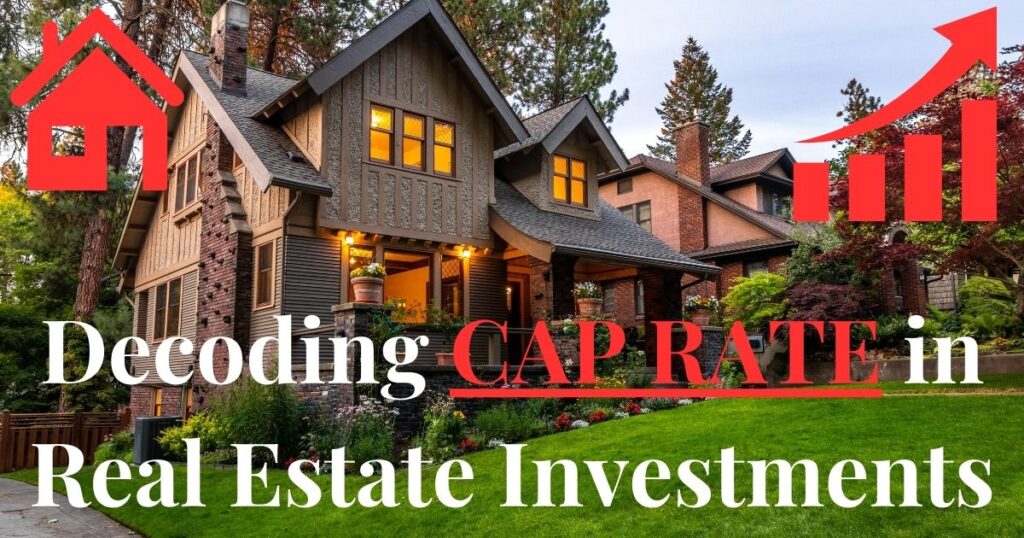
When it comes to evaluating the financial performance and profitability of real estate investments, there are several crucial metrics to consider. One such metric is the capitalization rate, commonly known as the “cap rate.” Cap rate plays a fundamental role in assessing the potential return on investment and determining the value of a property. In this blog post, we will delve into what a cap rate is, how it is calculated, and why it is essential for real estate investors.
Defining Cap Rate:
The capitalization rate, or cap rate, is a financial metric used in real estate to estimate the rate of return on an investment property. It is expressed as a percentage and measures the relationship between the net operating income (NOI) generated by the property and its purchase price or current market value. Cap rate provides investors with a snapshot of the property’s income-generating potential, irrespective of the financing structure or individual buyer’s financial situation.
Calculating Cap Rate:
To calculate the cap rate, one needs to know the property’s net operating income (NOI) and its current market value or purchase price. The formula for calculating cap rate is as follows:
Cap Rate = Net Operating Income (NOI) / Property Value
The net operating income (NOI) is determined by subtracting operating expenses (such as property taxes, insurance, maintenance costs, and property management fees) from the property’s gross income (rental income and other revenue streams). The property value can be the purchase price or the current market value.
Understanding Cap Rate’s Significance:
- Evaluating Investment Potential: Cap rate allows investors to compare the potential returns of different investment properties. A higher cap rate indicates a potentially higher return on investment, while a lower cap rate suggests a lower return.
- Risk Assessment: Cap rate also helps investors assess the risk associated with a particular investment property. Higher cap rates may indicate higher risk, such as properties in less desirable locations or those requiring significant repairs. Conversely, lower cap rates are often associated with lower risk properties, such as prime locations or stabilized assets.
- Valuation Tool: Cap rate serves as a valuation tool in real estate. By dividing the property’s net operating income by the cap rate, investors can estimate the property’s value. For instance, if a property generates an annual NOI of $100,000 and the prevailing cap rate in the market is 5%, the estimated property value would be $2 million.
- Market Insights: Monitoring cap rates in a specific market can provide valuable insights into trends and investor sentiment. Rising cap rates may indicate a cooling market or increased risk perception, while declining cap rates might signify a hot market with high demand.
Factors Affecting Cap Rate:
Several factors influence the cap rate of a property, including location, property type, condition, tenant quality, lease terms, and prevailing market conditions. Investors must consider these factors when assessing the cap rate and determining the suitability of an investment.
Conclusion:
The capitalization rate (cap rate) is a vital metric for real estate investors seeking to evaluate potential investments and estimate property values. By comparing the net operating income to the property value, investors can gain insights into the income-generating potential and assess the associated risks. Understanding the cap rate allows investors to make informed decisions and allocate their resources effectively in the dynamic world of real estate investment.
Remember, while the cap rate is a useful tool, it is essential to consider other factors and conduct comprehensive due diligence before making any investment decisions. Real estate investing requires careful analysis and an understanding of the local market dynamics to maximize returns and mitigate risks.
Looking to elevate your real estate business with a high-converting logo? AsianLogos specializes in creating stunning, customized logos that attract clients and amplify your brand. Our expert designers have helped a NYC-based real estate company increase revenue by 181% and achieve 10X sales through a new logo design. Experience the power of a logo that reflects your values and vision, boosting brand recognition and building trusted relationships with clients. Contact us today to unlock the potential of our real estate logo design and take your business to the next level!
- Follow us on Twitter for industry insights and design inspiration.
- Connect with us on LinkedIn to stay updated on real estate branding trends.
- Like us on Facebook for a glimpse into our logo design portfolio and client success stories
- Follow us on Pinterest for recent blog post
